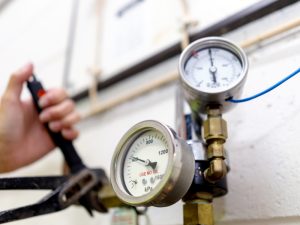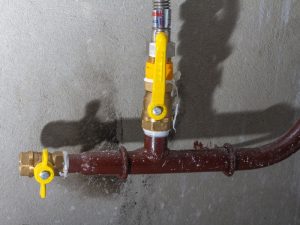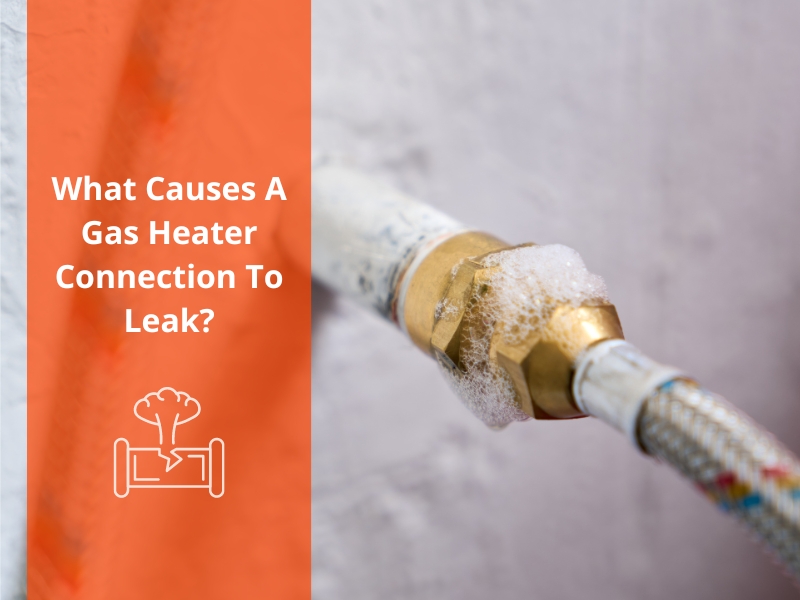Keeping your Sydney home warm and cosy is a priority. Still, a gas heater leak can turn that comfort into a safety hazard. Natural gas, while efficient, is odourless – that’s why a harmless-looking scent like rotten eggs is added to help with detection. Taking immediate action is crucial if you suspect a leak in your gas heater connection.
This guide will explain the causes and warning signs of gas heater leaks. We’ll also discuss the importance of preventative maintenance, particularly for homes in coastal areas like Sydney, and how regular servicing can extend the lifespan of your gas heater.
Why do gas heater connections leak?
Several factors can contribute to a gas heater connection leak:
- Loose connections: Vibrations, thermal expansion, and contraction can cause gas line connections to loosen. This allows gas to escape, creating a leak.
- Worn seals: Seals within the gas line connections can deteriorate due to age and exposure to heat. Cracked or damaged seals won’t form a tight barrier, leading to leaks.
- Corrosion: Gas lines can corrode, especially in beachside areas with salty air. This weakens the metal, making it more susceptible to leaks.
- Improper installation: If your gas heater wasn’t installed correctly in the first place, there’s a higher chance of connection leaks developing later on.
What are the signs of a gas heater connection leak?
Early detection of a gas heater leak is crucial. Here are some warning signs to be aware of:
- The Smell of gas: The most common sign is the distinct odour of rotten eggs, indicating the presence of natural gas.
- Hissing sounds: A hissing or whistling noise near your gas heater can signify a leak.
- Pilot light issues: If your pilot light frequently goes out or burns yellow instead of blue, it could be due to a gas leak affecting the proper flow.
- Increased condensation: Excessive moisture buildup around your gas heater can indicate a leak.
- Health symptoms: In severe cases, prolonged exposure to a gas leak can cause headaches, dizziness, nausea, and even difficulty breathing.
How can you prevent gas heater leaks?
Taking preventative measures helps minimise the risk of leaks and ensures your gas heater operates safely and efficiently:
- Schedule regular servicing: A licensed gas fitter can inspect your gas lines and connections, identify potential issues, and ensure everything functions correctly.
- Visually inspect connections: Regularly check your gas lines for any visible signs of damage, corrosion, or loose connections.
- Don’t DIY gas line work: Gas connections are complex. To guarantee safety, leave any repairs or maintenance to a qualified gas plumber.

What should you do if you suspect a gas leak in your heater?
If you suspect a gas leak, follow these steps immediately:
- Turn off the gas supply: Locate the gas shut-off valve for your heater and turn it off completely.
- Evacuate the area: Everyone in the house needs to leave immediately and head for fresh air. Don’t use electrical appliances or light switches—sparks can ignite the gas.
- Open windows and doors: Ventilate the area to remove any lingering gas.
- Call a licensed gas fitter: Only re-enter the house once a qualified professional has confirmed it’s safe.
How can professional gas plumbing services help prevent leaks?
A licensed gas plumber can offer a range of services to prevent leaks and ensure your gas heater operates safely:
- Leak detection: Experienced technicians specialise in gas line leak repair and use advanced techniques to locate and address leaks accurately.
- Connection tightening: They’ll ensure all gas line connections are secure and properly sealed.
- Seal replacement: If any seals are worn or damaged, they’ll be replaced with new ones.
- Corrosion inspection: They’ll assess your gas lines for corrosion and recommend appropriate solutions.
Why is gas heater maintenance crucial for beachside properties?
Sydney’s coastal location means your gas heater is exposed to salty air, which can accelerate corrosion on gas lines. Regular maintenance helps identify and address potential corrosion issues before they lead to leaks.
What are the local standards for gas heater safety in Sydney?
Here are some essential local standards to remember regarding gas heater safety in Sydney:
- Installation permits: Always obtain the necessary permits before installing a gas heater.
- Licensed gas fitters: All gas heater installations, repairs, and maintenance must be carried out by licensed gas fitters. In Sydney, gas fitters must be registered with the NSW Government’s Fair Trading department.
- Fire safety: Gas heaters must comply with NSW fire safety regulations. This includes proper installation, ventilation, and regular inspections.
- Carbon monoxide detection: Carbon monoxide is a colourless, odourless gas that can be deadly. It’s essential to have a working carbon monoxide detector installed near your gas heater.
- Bushfire-prone Areas: If you live in a bushfire-prone area, there may be additional regulations and safety measures to follow for your gas heater.
- Beachside properties: Gas heaters in coastal regions are exposed to corrosive salt air. Regular maintenance and inspections are crucial to prevent leaks and ensure safe operation.
- Building codes: Gas heater installations must comply with the latest building codes in NSW.
How does regular gas heater servicing extend the lifespan of your system?
Regular gas heater servicing by Apex Gas Heater Service not only helps prevent leaks but also extends the lifespan of your gas heater:
- Early detection of issues: Routine inspections allow for early detection of potential problems, preventing them from escalating into costly repairs or replacements.
- Improved efficiency: Clean and well-maintained gas heaters operate more efficiently, saving you money on energy bills.
- Safety assurance: Regular servicing ensures that your gas heater operates safely and reduces the risk of carbon monoxide poisoning.
- Compliance with regulations: Servicing helps maintain compliance with local gas safety regulations, protecting your home and family.

Conclusion
Prioritising natural gas safety is essential for ensuring the safety and efficiency of your heating system. Understanding the common causes of leaks, recognising the warning signs, and taking preventative measures can significantly reduce the risk of gas leaks in your Sydney home.
Need gas line leak repair in Sydney?
If you’re concerned about the safety of your gas heater or suspect a leak, don’t hesitate to contact Apex Gas Heater Service. Our experienced gas plumbers are available to provide prompt and reliable service, ensuring your home remains safe and comfortable throughout the year.

